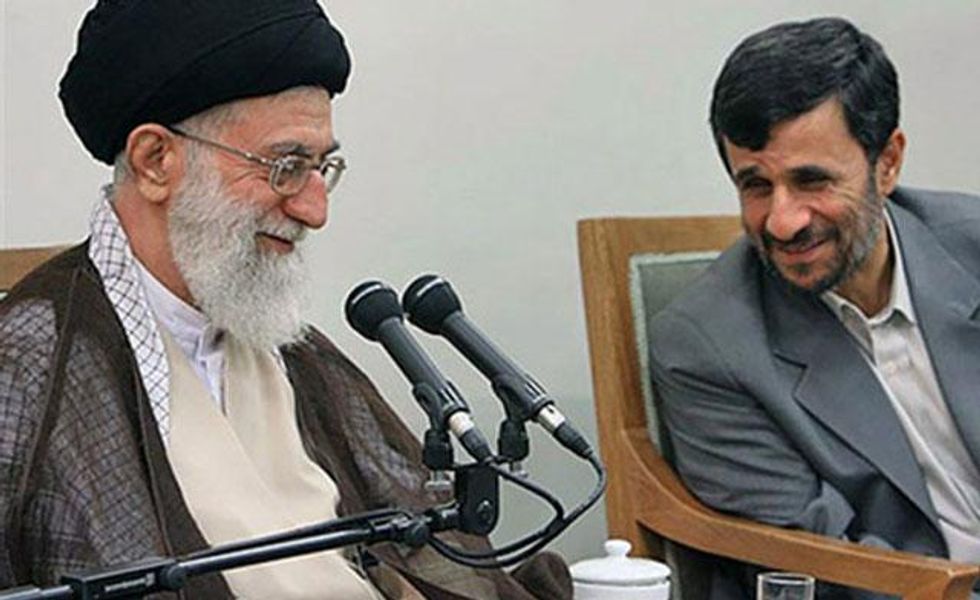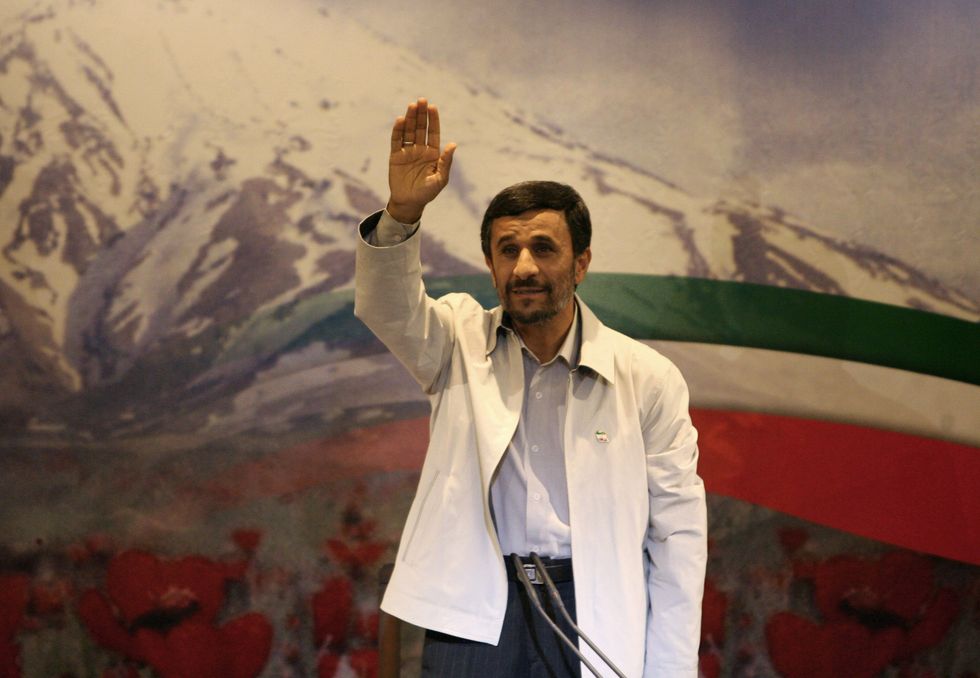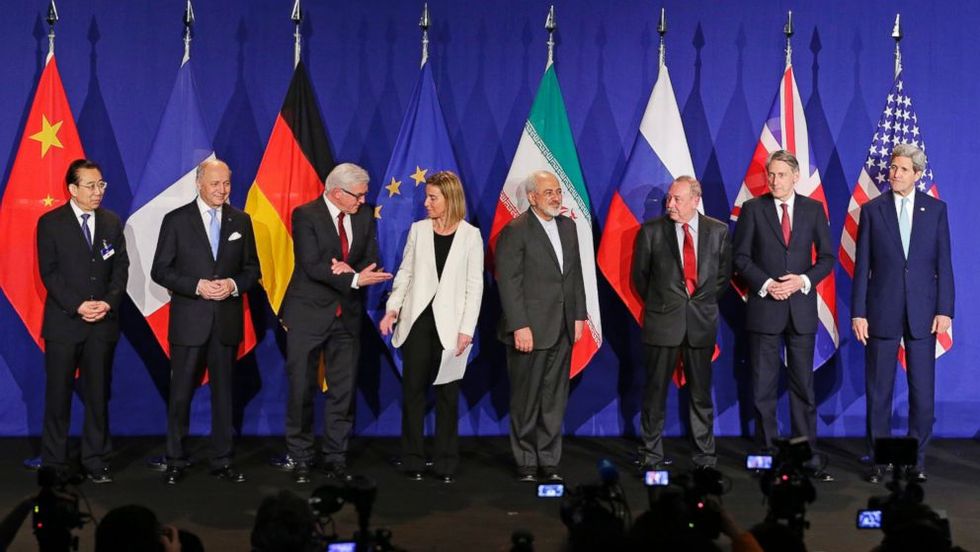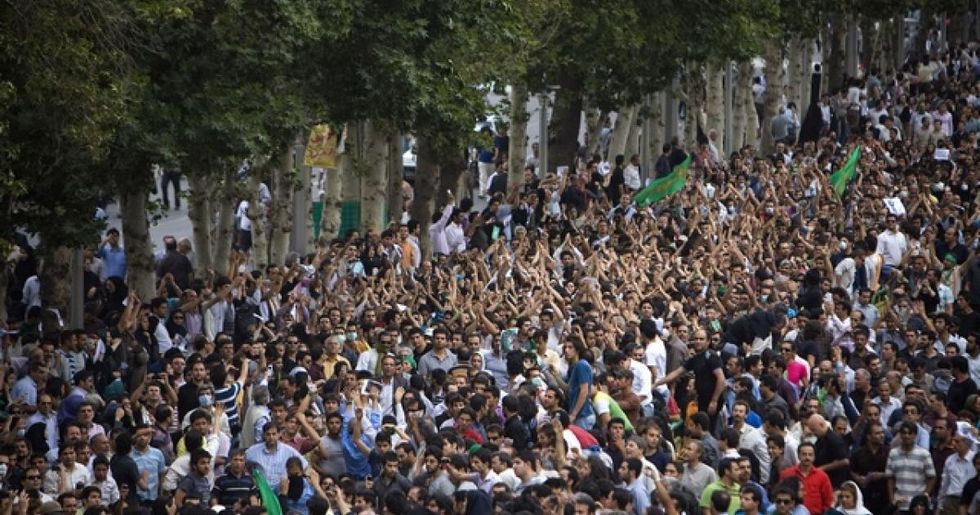With an upcoming election next month, Iranians headed to the polls will be faced with a difficult choice in choosing who will be their next president. In the fascinating government system that blends theocracy, dictatorship, and democracy, Iranians face a difficult choice for all of the wrong reasons. No candidates on the ballot can truly bring about the change Iranians deserve. That being said, the choice isn't any less critical. A candidate has come out of the shadows of Iranian politics, threatening vicissitude at a crucial juncture in the Islamic Republic’s history. Former Iranian President Mahmoud Ahmadinejad, who served from 2005 to 2013, has decided to enter the race to reclaim his former position. It may be difficult for a number of reasons for him to get elected to an unprecedented third term, but if he does manage to succeed, Ahmadinejad will roll back any progress made since he left office. Given his record on the economy, foreign policy, nuclear policy, human rights, and corruption, Iranians must reject Ahmadinejad.
On April 12, Ahmadinejad stunned people in Iran and across the globe when he filed paperwork to compete in the upcoming Iranian presidential election in May, 2017. This is significant not only because a former president is vying for his old job, but also given Iran’s political climate. Six months ago, the Supreme Leader Ali Khamenei publicly advised against him seeking a third term. The Supreme Leader is the head of state and ultimate authority in the country, and public dissent like this is an anomaly in the politics of Iran.
The president of Iran is the second most powerful person in the country, second only to the Supreme Leader. While the Supreme Leader may have final say on issues ranging from foreign policy to the nation’s economy, the president still plays a key role in the government. The Council on Foreign Relations has published numerous articles examining the governmental system of Iran. A recent article explained that the president appoints provincial governors, cabinet members, and ambassadors. The constitution of Iran bestows on the president the responsibility for “national planning, and budget and state affairs.” They also control the resources of the state, including oil revenues.
Whether Ahmadinejad will be approved to be a candidate is still up in the air. Another facet of the fascinating blended dictatorship, theocracy, and democracy is that candidates must be extensively vetted and then approved for the presidency. An office seeker must first meet specific requirements. They must be of Iranian origin, a citizen, a believer in God, be over the age of 21, have a “good past record,” exhibit “trustworthiness and piety,” and posses a “conviction in the fundamental principles of the Islamic Republic of Iran.” Ahmadinejad meets these basic requirements, although possessing a “good past record” and exhibiting “trustworthiness and piety” are debatable. The next step is the first place where the former president may run into trouble. Iranians who wish to be placed on the ballot must first be approved by the Guardian Council. This elite group of twelve is composed of six Islamic theologians appointed by the Supreme Leader and six legal experts. The legal experts are elected by the Iranian Parliament, from candidates nominated by the Head of the Judicial Power. The Guardian Council vets and widdles down the possible candidates significantly. In 2009, only four candidates were approved out of 476 who filed paperwork. In 2013, eight candidates were approved out of 680 possible candidates. Approved candidates are highly unlikely to challenge the Supreme Leader or drastically change the status quo, but can still differ on key issues affecting Iranians.
Taking into account that the Supreme Leader advised against Ahmadinejad running for president again, it is entirely possible that he could be rejected by the Guardian Council. His ambitions are confusing to say the least, he said that he entered the race to help an ally get elected, but the possibility of this polarizing politician gaining power as president is frightening for Iranians and the global community. If Iran is to make any progress in becoming more ingrained in the global economy, having better relations with decades old foes, and improving its human rights record, Mahmoud Ahmadinejad is not the leader Iran needs.
After first being elected in 2005, Ahmadinejad rolled back previous economic reforms made by his predecessors Mohammed Khatami and Akbar Hashemi Rafsanjani. Both previous presidents pursued policies that would liberalize Iran's economy. Ahmadinejad campaigned as a populist, appealing to Iranians on the lower rungs of society. Once in office, he broke with precedent by not pursuing more liberalization and privatization of the nation’s economy. His presidency was marred by economic turmoil. Brandeis University commissioned a study on Iran's economy during his time in office. The study found that between 2005 and 2013, GDP growth was much slower than in previous years and Iranians only saw a 10% increase in per capita income, smaller than in years previous. Toward the end of Ahmadinejad’s presidency, Iran faced rampant inflation and skyrocketing unemployment. The economic woes were caused not only by his economic policies, but also because he and his country became magnets for international sanctions.
In fact, the United Nations Security Council passed eight resolutions against Iran during his presidency. Despite the objections of countries across the globe, Iran invested heavily in its nuclear program. While Ahmadinejad insisted that the program had peaceful goals, many worried that they had more sinister motives. The United States, European Union, Japan, and South Korea all imposed sanctions on Iran during his presidency. These sanctions included a block on all arms exports, assets freezes on key individuals and companies, and a ban on the import and purchase of Iranian natural gas. Additionally, American sanctions prohibited nearly all trade with the country. The toll of these sanctions included a drastic increase in the percentage of families living in poverty and a reduction in the value of their currency. The sanctions imposed because of Iran’s nuclear program under Ahmadinejad’s presidency were ultimately disastrous for the Iranian economy.
Ahmadinejad’s successor, Hassan Rouhani, was elected in 2013 as a Moderate. He has since pursued a foreign-policy more open to the rest of the world than his predecessor. This culminated in the 2015 Iran Nuclear Deal. This milestone in U.S.-Iranian relations stipulated that Iran give up 97% of their enriched uranium, go from 20,000 centrifuges to 5,000, and keep their uranium enriched at 3.67%. For context, uranium enriched for medical purposes would have a 20% enrichment rate and weaponized uranium would be enriched at a 90% rate. To ensure that Iran keeps up its end of the bargain, they agreed to vigorous inspections to ensure compliance with the new rules and regulations.
As a result, America and other P5+1 nations involved in the negotiations were required to relieve Iran of the crushing sanctions that have been holding back the economy for years. Given the Iranian government’s human rights abuses and questionable nuclear ambitions, sanctions were understandable at the time. Looking closer, they have not loosened the grip of the government on the Iranian people. The sanctions have instead disproportionately adversely affected the middle and lower classes of the country. The Iran Nuclear Deal stopped Iran from becoming a nuclear state, and set in motion Iran becoming a part of the global economy.
Americans are familiar with the division caused by the Iran Nuclear a Deal in domestic politics. The Republicans vying for their party’s nomination in the 2016 Presidential election all agreed that the deal was bad for America and the world. While campaigning for president, Donald Trump railed against the deal. Like conservatives in the United States, conservative hardliners in Iran were not fans of the deal. They have felt that the “Great Satan,” aka America, should not be dictating any requirements that their country must follow. The upcoming election in May will be a referendum on how the Iranian people, beyond the feuding Moderates and Conservatives in the government, view the deal and its fallout. The Conservatives will likely take advantage of the fact that sanctions being lifted have not improved Iran's economy in the short term as drastically as some expected, but will neglect to reference the long term effects.
Hassan Rouhani was able to capture the presidency in 2013 because conservatives were unable to unite behind one suitable candidate. The splintered hardline voting base helped a Moderate, who is more open to liberal reforms in the economy, on human rights, and in international relations, get elected. (It is important to remember “moderate” in the context of Iran’s political climate and not measure in comparison to Western standards). Mahmoud Ahmadinejad is controversial in Iran like he is internationally, but still relatively popular. In recent months, he's toured many of the areas of Iran that helped propel him to victory in his two elections. There are still conservatives in Iran who dislike Ahmadinejad, but it is entirely possible that he could consolidate support among conservative hardliners to be victorious.
Ahmadinejad still faces some large obstacles. No president in Iran has ever been deprived of a second term. Whether that is because of popularity or corruption is debatable. Before Ahmadinejad entered the race, the conservative void was being filled largely by Ebranim Raisi, who has been a fixture in the Iranian judicial system for decades. An Ahmadinejad victory, or that of any hardliners to an extent, would lead to a reversal in the small amount of progress Iran has made in the past four years. His economic policies will cause more inflation and unemployment. His actions in foreign and nuclear policy would lead to more sanctions on Iran, once again shutting the nation off from the world economy. The Iran Nuclear Deal, which is already under threat from President Donald Trump on one end, would struggle to survive with a President Ahmadinejad on the other. His record on the economy and desire to shakeup international relations would be a disaster for the Iranian people, not even taking into consideration its effects on human rights.
Iran has one of the most atrocious human rights records in the world. No candidate for the presidency would be able to bring in sweeping and unprecedented reforms. Even Moderates like Rouhani have not drastically improved the government's human rights record to the extent that is needed. That being said, any possibility of progress flies out the window with a third term for Ahmadinejad. During his two terms, he cracked down on dissent. Human Rights Watch observed, “Respect for basic human rights in Iran, especially freedom of expression and assembly, deteriorated in 2006. The government routinely tortured and mistreated detained dissidents, including through solitary confinement. (...) The Ahmadinejad government, in a pronounced shift from the policy under former president Mohammed Khatami, has shown no tolerance for peaceful protests and gatherings.” After his controversial reelection in 2009, which included several reported cases of voting irregularities and other candidates submitting official complaints, protests erupted across the nation. The peaceful protesters were met with brutal crackdowns by state police. The protests were eventually quelled, ending with hundreds of arrests and dozens murdered.
Corruption has run rampant in Iranian politics look before Ahmadinejad took the oath of office, but worsened during his presidency. He had numerous family members serve in his government, from siblings to in-laws, and appointed close friends to positions in government without any prior existence. The International Crisis Group has criticized his administration for attacking private ‘plunderers’ and ‘corrupt officials,’ while engaging in ‘cronyism and political favouritism.’” The Iranian parliament commissioned numerous investigations into his actions as president. The corruption has seeped from the top down. The Vice President who served during his second term, Mohammad Reza Rahimi, is currently serving a five year sentence for money laundering and embezzlement.
The seventy seven million people of Iran deserve much better than their options. No candidate in the 2017 election, nor candidates likely in future elections will meet the needs of the Iranian people. Moderates and conservatives both have disrespected human life, depriving Iranians of a truly free and just society. When it comes to Iranian elections, it is truly a “lesser of two evils” scenario.” A third term for Mahmoud Ahmadinejad would roll back progress made on Iran entering the global economy, achieving détente with a decades old foe, rebuilding its economy, and moving forward on human rights and removing corruption. The ideals of Ahmadinejad and other conservative hardliners are antithetical to those who believe in a free society. In May, Iranians will not have an ideal candidate on the ballot, but must chose to move forward, even if it's incremental.























